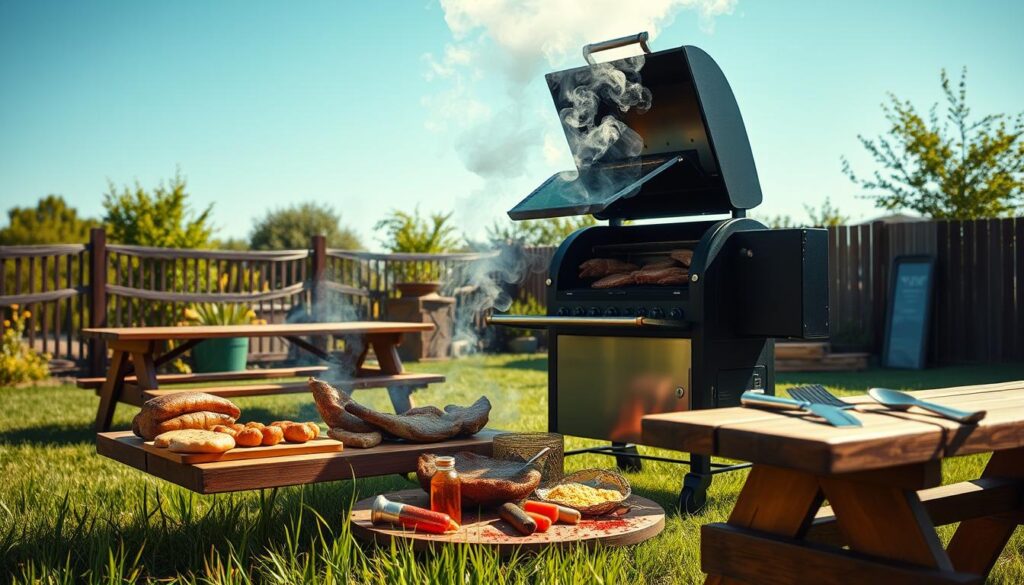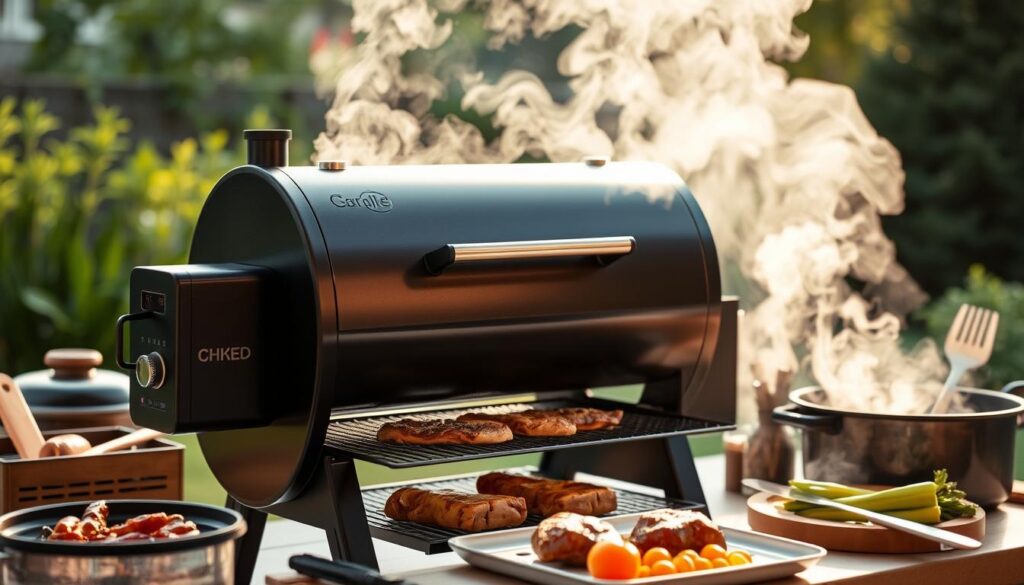Types of Smokers
Imagine this: over 75% of BBQ fans use pellet smokers for tender meat. Entry-level pellet grills start at $400, but top models like the Yoder can cost up to $2500. This shows the wide range of smokers out there.
For BBQ lovers, knowing about different smokers is key. There are electric, pellet, charcoal, propane, and offset smokers. Each type has its own features and suits different cooking styles. Whether you prefer the ease of electric or charcoal for smoky flavor, there’s a smoker for everyone.
Key Takeaways
- Pellet smokers offer a “set and forget” cooking style, with temperatures ranging from 160-500°F.
- Charcoal smokers are ideal for authenticity, producing a deep smoky flavor but require more maintenance.
- Gas smokers are praised for their simplicity, ease of temperature control, and quicker startup times.
- Offset smokers can cook massive amounts of food, with high-quality models costing over $2000.
- Electric smokers are user-friendly, similar to operating a microwave oven.
Introduction to Smokers
Smoking food has been around for ages, mainly for keeping food fresh. Now, it’s all about making food taste better and feel more tender. Choosing a smoker means thinking about space, fuel, effort, and cost.
For beginners, knowing the basics is key. Smokers burn fuels like charcoal, wood pellets, propane, and electricity. Each fuel gives food its own special flavor. Hardwoods like hickory, oak, and apple are favorites for that smoky taste.
It’s important to know how to use and care for a smoker. Backyard BBQ smokers cost between $500 and $2500. With good care, they can last 30 to 35 years.
Here’s a list of barbecue essentials you need to know:
- Fuel Type: Choose from charcoal, wood pellets, and more.
- Temperature Control: Recipes often call for 200 to 220 degrees Fahrenheit.
- Meat Selection: Brisket, pork shoulder, and poultry are favorites.
- Cooking Time: Smoking can take from 1 hour to over 20 hours.
- Flavor Impact: The wood used greatly affects the taste of smoked food.
- Maintenance and Upkeep: Good care makes your smoker last for decades.
There are many smokers for beginners to choose from, from simple to high-end models. Knowing your options helps you pick the right smoker for your needs. Whether you prefer a classic charcoal smoker, an electric model, or a pellet grill, the goal is to find one that fits your cooking style and improves your BBQ experience.
What Are the Different Types of Smokers
Knowing what are the different types of smokers can really improve your BBQ game. Each smoker has its own perks and fits different tastes. So, it’s key to compare them to find the right one for you. Let’s explore the main types of smokers and what makes them special:
Electric Smokers: These smokers keep the temperature steady and run on electricity. They’re perfect for those who want a hassle-free BBQ experience.
Charcoal Smokers: Charcoal smokers give off amazing flavors. But, they need constant attention to keep the fire going. They might cost more to use, but the taste is worth it.
Pellet Smokers: Pellet smokers use wood pellets for heat. They offer easy temperature control and a hands-off smoking experience. But, they can be pricey and have parts that might break.
Propane Smokers: Propane smokers are easy to control and keep the heat steady. They’re also easy to find parts for. But, you need to watch the propane levels. They’re great for taking on the go.
Every smoker type—electric, charcoal, pellet, and propane—can make delicious food. So, picking the right one depends on what you value most. For me, an electric smoker was the best choice because it’s easy to use and versatile.
In short, picking the best smoker is about finding a balance. You might want something easy to use, or you might prefer the authentic taste of charcoal. Knowing what are the different types of smokers helps you choose the one that fits your cooking style and needs.
Electric Smokers
Electric smokers have changed the game in easy barbecue smoking. They offer convenience and simplicity for both newbies and experts. These smokers use electricity to keep the temperature steady, making smoking easy and hassle-free.
How They Work
Electric smokers heat up the cooking chamber with an electric element. The temperature is controlled by electronics, allowing for precise adjustments. This makes smoking vegetables and fish quickly and reliably.
Pros and Cons
Electric smokers are great for those who want it easy:
- Convenience: They start quickly and are easy to use, perfect for a hassle-free experience.
- Consistency: They keep temperatures steady, which is great for smoking vegetables and fish quickly.
- Safety: They have less risk of flare-ups and are mess-free.
- Range: Prices range from $180 to $400, fitting different budgets.
But, there are some downsides to consider:
- Flavor: Some say electric smokers don’t have as strong a smoke flavor as traditional methods.
- Temperature Control: They can struggle to keep a high temperature, especially compared to indoor ovens.
The Masterbuilt electric smoker is a standout. It’s 26 x 41 x 20 inches, weighs 73 pounds, and has a cooking area of 970 square inches. Its 800-watt power allows for temperatures up to 275 degrees Fahrenheit, ideal for beginners.
| Brand | Cooking Area | Power | Temperature Range |
|---|---|---|---|
| Masterbuilt | 970 sq. in. | 800 watts | Up to 275°F |
| Cuisinart | 548 sq. in. | 1500 watts | 100-400°F |
| Bradley Smoker | 806.4 sq. in. | 1000 watts | 86-320°F |
| Char-Broil Analog | 544 sq. in. | 1200 watts | 100-350°F |
Overall, electric smokers are a great choice for beginners or anyone looking for an easy smoking experience.
Pellet Smokers
Pellet smokers are getting more popular for their ease and flexibility. They mix automated temperature control with the taste of wood, offering a special grilling experience. Let’s explore how they work and their good and bad points.
How They Work
A pellet smoker burns wood pellets as fuel. These pellets are fed into a fire pot by an auger. An igniter starts the fire, creating heat and smoke. The smoker’s automated system keeps the temperature steady by controlling the pellets and fan speed.
This lets users set exact temperatures, often within 5 degrees. The temperature stays within 10 degrees of the setpoint.
Pros and Cons
Pellet smokers have many benefits:
- Consistency: The automated system ensures even cooking, no matter the outside temperature.
- Versatility: These smokers can grill, roast, smoke, and even bake, making them very useful.
- Simplicity: They are easy to use, needing little help during cooking.
But, there are some downsides too:
- Cost: Pellet smokers are pricier than gas grills, starting at around $400.
- Electricity Dependency: They need electricity to work the automated system and auger.
Pellet smokers have cooking areas from 200 to over 700 square inches. They suit both small family events and big commercial needs. Their ease and versatility are big pluses, but their cost and need for electricity are things to think about.
Charcoal Smokers
Charcoal smokers are known for their authentic barbecue flavor. They use charcoal, which adds a smoky taste to food. This requires more effort than other smokers. Whether you’re a pro or new to grilling, knowing about top charcoal smokers can improve your BBQ.
Testing showed the best charcoal smokers after 50 hours. The Dyna-Glo Signature Series Vertical Offset Charcoal Smoker was the top pick. It has 1,382 square inches of cooking area.
The Pit Barrel Cooker Classic Package was a close second. It has a unique design and 269 square inches of cooking space. This is great for hanging meat vertically.
The Masterbuilt vertical cabinet charcoal smoker was the best splurge. It has 1,320 square inches of cooking surface. The Wide Body Vertical Offset smoker is best for big meals, with 1,890 square inches of space.
These smokers were tested with quick smokes and longer sessions. The best had lots of space, racks, and hooks. This ensures good air flow and temperature control.
The Dyna-Glo Signature Series was the top smoker. It’s big, with 45.5 x 24.9 x 58.8 inches of space. The Pit Barrel Cooker and Masterbuilt smokers also stood out. The Wide Body Vertical Offset smoker is great for those on a budget.
What makes charcoal smokers special is the experience they offer. The effort to manage charcoal and temperature is worth it. It results in delicious, authentic BBQ every time.
Propane Smokers
Propane smokers, also known as gas smokers, are a simple alternative to traditional smoking. They are perfect for beginners who want easy and controlled smoking.
How They Work
Propane smokers use propane gas to heat the smoking chamber well. The gas burners let users control the temperature exactly. This ensures consistent cooking results. They heat up fast, making them easier to use than charcoal smokers.
Pros and Cons
Propane smokers have many benefits:
- They heat up quickly and have easy temperature control.
- Managing gas is easier than charcoal.
- They render fat well and add a nice char to meat.
But, they also have some downsides:
- They might not give as deep a smoke flavor as charcoal or wood.
- They can have temperature swings, affecting consistent smoking.
- They can have gas leaks, so regular maintenance is needed.

| Gas Smoker Model | Dimensions | Cooking Area | Number of Racks | Price |
|---|---|---|---|---|
| Camp Chef Smoke Vault | 16 x 24 x 24 inches | 903 square inches | 2 + 1 jerky rack | $450 |
| Pit Boss | 47 x 23 x 22 inches | 720 square inches | 4 | $350 |
| Char-Broil Gas Smoker | 46 x 22 x 22 inches | 595 square inches | 4 | $250 |
| Cuisinart Gas Smoker | 46 x 20 x 20 inches | 784 square inches | 4 | $300 |
In summary, propane smokers are a convenient and efficient way to enjoy smoked foods. They offer ease of use, good performance, and are affordable.
Offset Smokers
Offset smokers are beloved by many grilling fans, including me. They have a separate firebox on the side of the main cooking area. This design ensures indirect heat and smoke for great flavor.
How They Work
Fuel like wood or charcoal burns in the firebox, creating smoke. This smoke goes into the main cooking area. This setup cooks food slowly, giving it deep smoky flavors.
Modern designs, like square fireboxes, are popular for being easy to use. Round fireboxes are loved for their classic look and wood fire management.
The firebox’s size is key for good performance. A length of 24 to 28 inches works well for most backyard offsets. The firebox’s width should match the cooking chamber to avoid cold spots. Using 1/4-inch thick steel for the firebox makes it durable. Insulated fireboxes need less wood, but might change the smoke flavor.
Pros and Cons
Offset smokers have both good and bad points:
- Pros:
- Flavor Control: They offer unmatched flavor due to smoke exposure.
- Capacity: They can cook a lot of food, perfect for big gatherings.
- Cons:
- Temperature Management: Keeping a steady temperature is hard and needs constant attention.
- Cost: High-quality smokers are pricey but worth it for their performance and durability.
Brands like the Dyna-Glo Signature Series Vertical Offset Charcoal Smoker have big cooking areas. With 1,382 square inches, they’re great for any smoking session. The right design and quality make every barbecue a success.
Choosing the Best Smoker for Beginners
When picking the best smoker for beginners, it’s key to think about ease and flavor. Electric smokers are great for newbies because they’re easy to use. But, they might not add as much flavor to your meat.
Pellet smokers are another good choice for beginners. They’re known for being easy to use and offer consistent smoke. This makes them perfect for getting that smoky taste without much work.

But, electric and pellet smokers can be pricey. For example, the Weber Smokefire EX6 Wifi Pellet Grill costs $1,300 on Weber’s site. Amazon has it for $1,219. Charcoal smokers, like the Weber Smokey Mountain Cooker, are more affordable at $419.
If you’re looking to spend a bit more, the Char-Griller Grand Champ is worth it. It costs $599, but you can find it for $549 at Home Depot. It’s known for its quality and versatility, making it a great choice for beginners and experts alike.
In summary, choosing the best smoker for beginners means looking at ease of use and flavor. Whether you choose electric, pellet, or charcoal, knowing what you want will help you pick the right one. As Ed Randolph from Handsome Devil BBQ says, “I have an arsenal of 15 smokers.” This shows that once you start smoking meat, you might want to get more!
Conclusion
Exploring different BBQ smokers shows that the right choice depends on what you like, your budget, and how involved you want to be. Each smoker has its own perks. For example, electric smokers make cooking easy, while offset and charcoal smokers offer deep, rich flavors that fans love.
Our look at smoking methods highlights how versatile these smokers are. Pellet smokers, like the Bubba Keg Grill & Smoker, are great because they’re easy to use and save fuel. Vertical smokers, such as the Char-Broil Silver and the Brinkmann Smoke ‘n Pit, are ideal for cooking many foods at once. This variety lets barbecue lovers try new things and get better at smoking.
In wrapping up, think about what you need and want before picking a smoker. Whether you’re new to grilling or have lots of experience, there’s a smoker that can take your skills to the next level. No matter your choice, these tips and suggestions are here to guide you. They aim to help you pick well and enjoy the tasty outcomes.

Leave a Reply